- Home
- Lois Lowry
A Summer to Die Page 7
A Summer to Die Read online
Page 7
Suddenly, very quietly, Molly got up, went over to Dad, and climbed onto his lap. He didn't say anything. He just put his book down, put his arms around her, held her, and watched the fire. She put her head on his shoulder like a sleepy two-year-old, and with one hand he stroked the fine, wispy, babylike hair she has left.
I could understand, I guess, the change in Molly if she were still sick. But she isn't; she's perfectly well. She is still taking the pills, and every few weeks Mom takes her to Portland to the hospital, for tests, to make sure everything is okay. Soon, the doctors said, she'll be able to stop taking the pills altogether, and then her hair will grow back. She'll win a beauty contest, the specialist told her, when she has her curls again.
Mom told us that at dinner, after they had come back from the hospital, and Molly just smiled, the casual and tolerant kind of smile that most people give to small children who say foolish things. But there was a time when it would have meant something to Molly, to be told she was beautiful.
Well, things change. I just have to learn to adjust to what they change to.
One morning early in June, my father came into the kitchen, poured himself a cup of coffee, and sighed. I was just finishing my breakfast and had planned to spend all of Saturday morning in the darkroom. I had photographed Maria by her kitchen window, and Will and I were experimenting with different kinds of paper for the finished prints. I could hardly wait to try printing Maria in different contrasts, textures, and tones.
But when Dad pouts a cup of coffee, sits down in the kitchen, and sighs, I know I'd better stick around because something's up.
"I just got a phone call," he said, "from Clarice Callaway."
"Are your books overdue?" I asked. "She's a real stickler about overdue books."
He laughed. "No, she and I have achieved a pretty good understanding about my overdue books. I wish that's all it were. She started the conversation by saying, 'I don't want to meddle, but—' You know what that means."
"It means she wants to meddle. Sometimes she starts with, 'I don't mean to be inquisitive, but—.'"
"Right. And that means she means to be inquisitive. I can see you have Clarice figured out, Meg. Well, this time she's upset about Will renting the house. She says the whole village is up in arms—which I assume is a Callaway exaggeration–because there are hippies living in Will's house."
"Hippies? What's that supposed to mean?"
Dad frowned. "I don't know. Ben has a beard, and I guess by Clarice's definition that makes him a hippie. But maybe you can shed some light on the things she brought up. Is it true that Ben and Maria are growing marijuana behind the house?"
I started to laugh. "Dad, of course not. They've put in peas and strawberries so far. Ben wants to plant squash, but he hasn't decided what varieties yet. And his tomatoes and beans go in this week."
"Is it true that they walk around nude?"
"Good grief, Dad. No, it isn't true, but even if it were, whose business would it be? They're out in the middle of nowhere. One afternoon Maria took off her shirt and lay in the sun. When I came along, she had her shirt off, and she asked me if I minded. I said I didn't, and she left it off for a while. She gets so hot and uncomfortable, because the baby's due soon."
"Well, that was another of Clarice's topics. Is it true that they're planning to have that baby by themselves, in the house?"
"Yes. But they've both been reading everything they can find about delivering a baby. Maria's doing all sorts of exercises, and they took a course together in Boston. And Dr. Putnam in the village has agreed to come if they need him."
Dad scratched his head. "No chance that they'll change their minds about that?"
"I don't think so, Dad. It's very important to them. They're really excited about doing it themselves, about having the baby born there in the house, instead of in a hospital. They don't like the impersonal qualities of a hospital. But the baby's important to them, too. They're doing everything they can to be sure the baby will be safe and healthy."
"Well, I guess I can try to convince Clarice of that. So that leaves only one thing. They are married, aren't they?"
I stirred the last soggy Rice Krispies in the bottom of my bowl. "They love each other. They talk about being old together, sitting in rocking chairs on their porch, and what it will feel like to kiss each other when they have false teeth and bifocals."
"That's not what I asked. Are they married?"
Funny how Rice Krispies stick to a bowl when they're wet. I really had to pry them loose from the sides of the bowl with my spoon. "I don't think so, Dad. Maria doesn't wear a wedding ring, and her last name is different from Ben's."
My father winced. "That's what I was afraid of. I don't quite know how to deal with that one. And Clarice has already called Will's nephew in Boston. Well, maybe you should talk to Ben and Maria about it, Meg. They might as well be prepared."
Great. What was I supposed to do, go tell my friends who were going to have a baby next month that I thought they ought to get married? What business was it of mine?
Still, my father was right. They ought to know what was going on. I gave up my plans for working in the darkroom that morning. Ben and Maria had asked if they could see some of my photographs, so I took the ones I'd done of Will, and two that I'd just finished of Molly. She hadn't even noticed my taking them; she'd been sitting on the front steps, working on some of her wild flowers. With Will's help, she'd mounted each of the flowers she'd pressed, and labeled them with their Latin names. One of the pictures showed Molly holding a blossom of Queen Anne's lace up against the sunlight; both she and the blossom were in silhouette. The other photograph was of her bent head, with what was left of her curly hair falling down over her face as she arranged some tiny flowers on a page.
Ben and Maria were hanging sheets and towels on the clothesline behind their house when I got there. They did their wash together every Saturday, using an old wringer machine that they'd bought at a garage sale. Ben always teased Maria that if she didn't have the baby on time, he would put her through the wringer and squeeze it out; just thinking about it makes my stomach lurch, but Maria thought it was funny.
"Hey, Meg!" Ben called cheerfully when he saw me coming. "This time next month, we'll be hanging diapers!"
"You mean you'll be hanging diapers," laughed Maria, as she snapped a wet dish towel into the air to get the wrinkles out. "I'm going to be lying in bed, being waited on. Having tea brought to me on a tray, while I recover!"
Knowing Maria, I didn't think she was going to be spending much time in bed recovering. She'd probably be up and around the day after the baby arrived, sanding the floors, building a bookcase, making raspberry jam. I talked her into letting me help Ben with the rest of the laundry, and she went inside to make a pot of tea.
We sat around their little painted kitchen table and shared tea with fresh mint in it. I took out the photographs to show them. They loved the ones of Will, because they love Will. But the two of Molly were better. They thought that, and I could see the difference, too. Partly it was because I have been learning so much from working with Will; partly it was because I was using his German camera now. He had taught me to use the different lenses; I had shot these two of Molly with the 90mm lens, and I'd been able, that way, to do it from a distance, so that she hadn't known I was doing it. The look on her face was absorbed, preoccupied with her flowers; the fine lens caught the sharp outline of sunlight on her hair and the shadows across her face and hands.
"I asked Molly if she wanted to come with me this morning," I explained, "but she wasn't feeling well. She said to say hi, though, and to see how you're coming with the cradle."
Maria grinned with pride and pointed into the living room, where the cradle stood, finished. It glowed with wax; folded over one side was a soft yellow crocheted blanket.
"Meg," asked Ben hesitantly, "what's wrong with Molly?"
I told them about her illness, about the nosebleeds, the hospital, the transfusions, and the
pills that were making her hair fall out. They were both very quiet. Ben reached over and ran his hand gently over the top of my head. "That's rough," he said. "That's very rough."
"Well," I explained, "it's not that big a deal. And she's lots better. Look." I pointed to one of the photographs. "See how round her face is getting? She's gained ten pounds since she came home from the hospital."
Maria poured more tea into our cups. "I'm glad we came here, Ben," she said suddenly, "for Molly. She's so excited about the baby."
That reminded me why I had come to see them. "Ben? Maria?" I said. "You know the little church in the village?"
"Sure," Ben said. "The white steeple. It looks like a postcard picture. Why? You going to photograph it?"
"No," I said. "But last Saturday, when I was in town with Mom to buy groceries, there was a wedding there. It was really neat. The bride came out and threw her bouquet from the step. The bridesmaids all had light blue dresses on, and—" I hesitated. "Well, I don't know. It was just nice."
Ben and Maria were both making faces. Ben is quite good at making faces; he screwed his mouth up sideways and crossed his eyes. "Weddings," he said. "Yuck."
Maria rolled her eyes and agreed with him. "Yuck," she said.
"Why?" I asked. "What's wrong with getting married, darn it?"
They both looked surprised. "Nothing's wrong with getting married," Ben said. "It's weddings that are so awful. What do you think, Maria, shall we show her?"
Maria grinned and nodded. "Yeah," she said. "She's a good kid."
Ben went into the living room and took a box out of the closet. He brought it back to the kitchen table and set it down. He leered, fingered his beard, and said in a diabolical voice, "Ya wanna see some feelthy pictures, lady?" Then he opened the box.
I started to laugh. They weren't bad photographs; in fact, technically, they were very good photographs, even though I'm not crazy about color.
But they were awful. And they were of Ben and Maria's wedding, for pete's sake. They were in a thick white leather album that said Our Wedding on the cover in gold letters. And I could see, while I looked at them, what Ben and Maria meant about yucky weddings.
There were the tuxedos, and the tails, and the top hats. There was Maria with her dress pulled up to show a lacy blue garter. There were the huge baskets of flowers beside the altar of the church. "Know what happened to those flowers?" Maria asked. "Two hundred dollars' worth of flowers? They got thrown away as soon as the service was over."
There was the wedding cake, about three feet high, decorated with birds and flowers and frosting ribbons. "Know how much that cake cost?" grinned Ben. "A hundred bucks. Know what it tasted like? Cardboard."
There were hundreds of people drinking champagne. "Know who those people are?" asked Maria. "My parents' friends. Ben's parents' friends. Know what they're doing? Getting drunk, on five hundred dollars' worth of champagne."
And there were Ben and Maria, surrounded by people, flowers, food. They were smiling at the camera, but they both looked as if they didn't mean it much.
"Know who that is?" Ben asked. I nodded. "That's Ben Brady and Maria Abbott, who wanted to get married in a field full of daisies beside a stream. Who wanted to have guitar music instead of a five-piece band; homemade wine instead of champagne," he said. He slammed the book closed and put it back in the box.
"Why didn't you?" I asked.
They shrugged. "Oh, sometimes it's just easier to please people," Maria said finally. "Ben's parents wanted a big wedding. My parents wanted a big wedding. We did it for them, I guess."
"Can I ask you a funny question?"
"Sure."
"Why don't you both have the same last name?"
It was Maria who answered me. "You know, Meg, I had the name Abbott all my life. Maria Abbott did things that I was proud of. I won a music award in high school, and I was Maria Abbott. I was elected to Phi Beta Kappa in college, something I worked hard for, and I was Maria Abbott. When I realized I wanted to marry Ben, I also realized that I didn't want to stop being Mafia Abbott. Ben could understand that. There's no law that says a wife must take her husband's name. So I didn't. Someday you may feel the same way about Meg Chalmets."
Right now I know there's no one I would rather be than Meg Chalmers. It's a funny thing about names, how they become part of someone. I thought suddenly of the little boy Will Banks, years ago, who sat in a room angry and sad, and carved WILLIAM on the closet floor.
"Hey," I said. Funny I hadn't thought to ask before. "The baby. What are you going to name him? Her? It?"
Maria groaned. "Ask any other question, Meg. Don't ask what we're going to name him her it. We can't decide. We fight about it all the time. We scream at each other. It's awful."
Ben said, "I've quit worrying about it. I figure the baby is going to arrive and before it does anything else, it's going to shake hands all around and say, 'Hi. I'm — — —.' That's the only way we're going to know what its name is."
Then he jumped up, bounded through the living room, and opened a door. "But look! This is where it will be born!" I looked through the living room and saw an empty room beyond, very clean, its walls freshly painted white, with a brass bed alone in the center.
"And this is where it will sleep," said Maria, smiling, touching the cradle with her bare foot, so that it rocked slightly.
"And this is what it'll wear!" said Ben proudly, reaching into the drawer of a partly sanded pine chest, and pulling out a tiny blue nightgown. The drawer was filled with little folded things.
"This is what it'll eat!" grinned Maria, cupping her hands around her breasts.
"And—" Ben stood still suddenly, in the middle of the living room. "Meg, come. I want to show you something." He took my hand, and I followed him out the back door, picking up my photographs on the way. It was almost lunchtime.
Ben took me past the garden where the peas were thriving against the wire trellises, across the newly cleared space where he'd been pulling up alders, past the little wooden bird feeder that Maria filled with seeds each morning. Behind a clump of young pine trees, he had pulled out brush and exposed part of a rock wall that had been there, I knew, for more than a hundred years. The sunlight filtered down through the nearby woods into the little secluded space; he had cut the grass there, and it was very soft, very green, very quiet.
He put his arm over my shoulders and said, "This is where we'll bury the baby, if it doesn't live."
I couldn't believe it. I pushed his arm off me and said, "What?"
"You know," he said firmly, "sometimes things don't work out the way you want them to. If the baby dies, Maria and I will bury it here."
"It's not going to die! What a horrible thing to say!"
"Look, Meg," Ben said, "you can pretend that bad things will never happen. But life's a lot easier if you realize and admit that sometimes they do. Of course the baby's probably going to be just fine. But Maria and I talk about the other possibility, too. Just in case; just in case."
I turned away from him and left him standing there. I was so angry I was shaking. I looked back; his hands were in his pockets, and he was watching me.
I said, "Just in case you're interested, Ben Brady, I think you're an absolutely rotten person. That baby doesn't deserve you for a father."
Then I walked home, and on the way home I was sorry I had said it, but it was too late to go back.
8.
Molly is in the hospital again, and it's my fault.
Why can't I learn when to keep my mouth shut? I'd already said something I regretted, to Ben, and hadn't had the nerve to go to him and apologize. It was just a week later that I blew it with Molly.
She was lying on her bed, in her nightgown, even though it was eleven in the morning. She's gotten so darn lazy, and my parents don't even say anything to her about it. That's partly why I was mad at her, to begin with, because she was still in her nightgown at eleven in the morning.
She was grouchy and mad, too. I'm not sur
e why. I think mostly it was because school had just ended, before she'd even had a chance to go back. Tierney McGoldrick hardly ever calls her anymore. She doesn't know it, but toward the end of school he started dating a red-haired senior girl. At least I was smart enough not to tell Molly that.
But there she was, lying on her bed, grumbling about how awful she looks. I am so sick of hearing Molly talk about how she looks. Her face is too fat. Her hair is too thin. To hear her talk, you'd think she was really a mess, when the truth is that she's still a billion times prettier than I am, which is why I'm sick of listening to her.
I told her to shut up.
She told me to drop dead, and before I dropped dead, to pick up my sneakers from her side of the room.
I told her to pick them up herself.
She started to get up, I think to pick up my sneakers and throw them at me, and when she swung her legs over the side of the bed, I suddenly saw what they looked like.
"Molly!" I said, forgetting about the sneakers. "What's wrong with your legs?"
"What do you mean, what's wrong with my legs?" No one had ever criticized Molly's legs before; in fact, even I have to admit that Molly's got nice legs. She held up her nightgown and looked down.
Both of her legs were covered with dark red spots. It looked like a lot of mosquito bites, except that they weren't swollen.
"Does it hurt?"
"No," she said slowly, looking puzzled. "What could it be? It wasn't there yesterday; I know it wasn't."
"Well, it's there now, and it sure looks weird."
She pulled her nightgown down to cover her legs. Then she got into bed and pulled the covers up around her. "Don't tell anyone," she said.

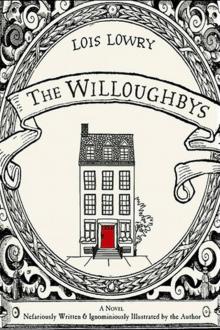 The Willoughbys
The Willoughbys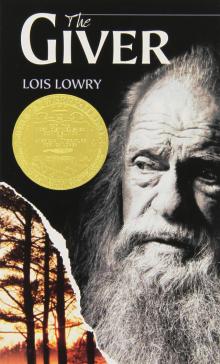 The Giver
The Giver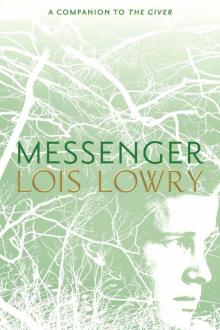 Messenger
Messenger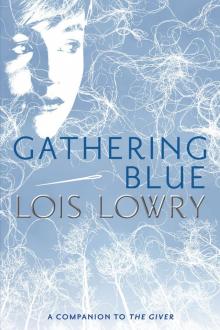 Gathering Blue
Gathering Blue Gooney Bird and All Her Charms
Gooney Bird and All Her Charms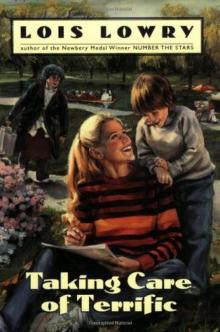 Taking Care of Terrific
Taking Care of Terrific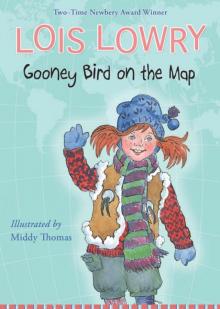 Gooney Bird on the Map
Gooney Bird on the Map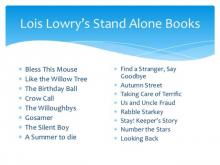 The Birthday Ball
The Birthday Ball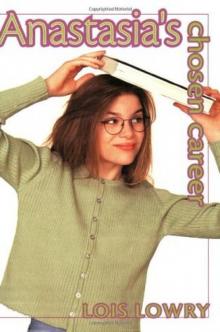 Anastasia's Chosen Career
Anastasia's Chosen Career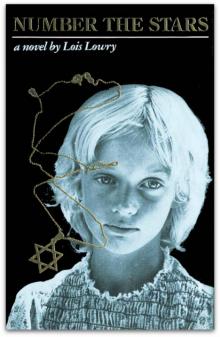 Number the Stars
Number the Stars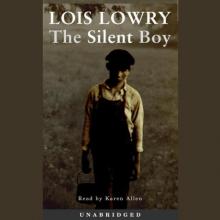 The Silent Boy
The Silent Boy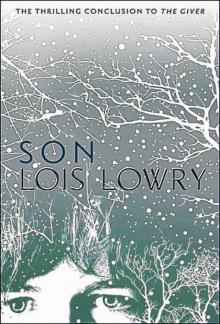 Son
Son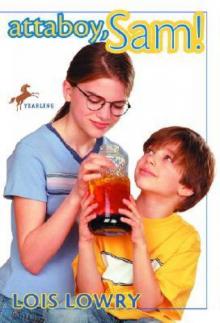 Attaboy, Sam!
Attaboy, Sam!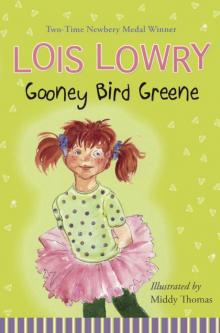 Gooney Bird Greene
Gooney Bird Greene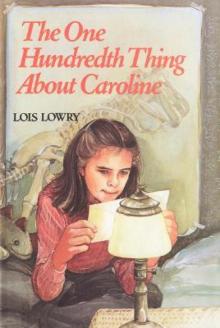 The One Hundredth Thing About Caroline
The One Hundredth Thing About Caroline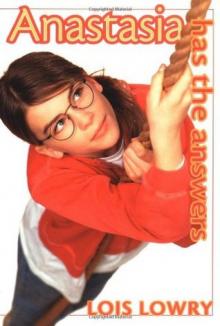 Anastasia Has the Answers
Anastasia Has the Answers Your Move, J. P.!
Your Move, J. P.!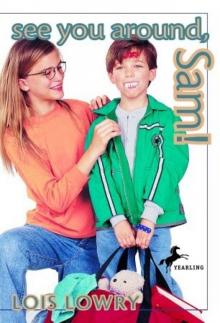 See You Around, Sam!
See You Around, Sam!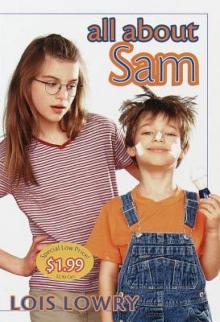 All About Sam
All About Sam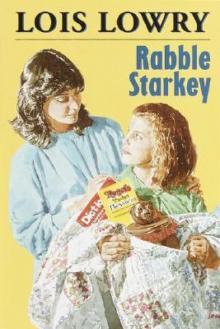 Rabble Starkey
Rabble Starkey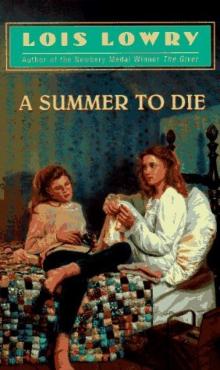 A Summer to Die
A Summer to Die Anastasia at This Address
Anastasia at This Address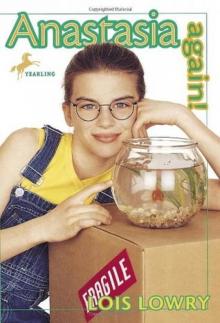 Anastasia Again!
Anastasia Again!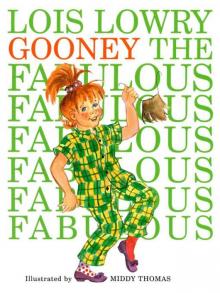 Gooney the Fabulous
Gooney the Fabulous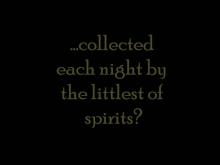 Gossamer
Gossamer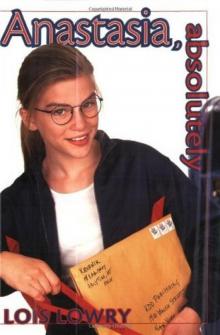 Anastasia, Absolutely
Anastasia, Absolutely Gooney Bird Is So Absurd
Gooney Bird Is So Absurd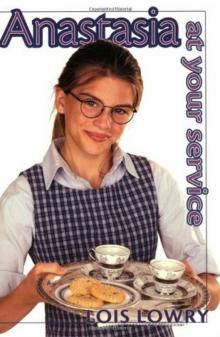 Anastasia at Your Service
Anastasia at Your Service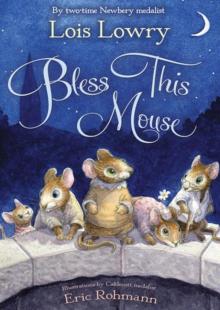 Bless this Mouse
Bless this Mouse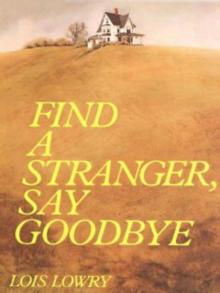 Find a Stranger, Say Goodbye
Find a Stranger, Say Goodbye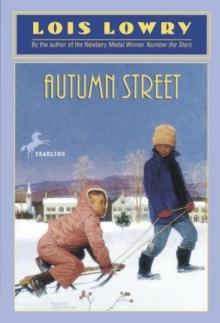 Autumn Street
Autumn Street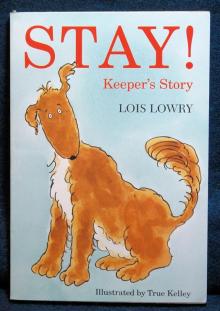 Stay Keepers Story
Stay Keepers Story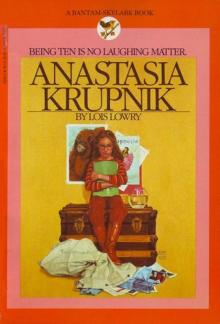 Anastasia Krupnik
Anastasia Krupnik Zooman Sam
Zooman Sam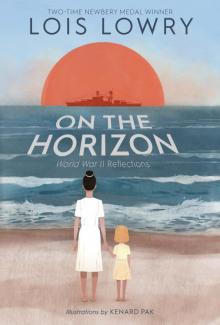 On the Horizon
On the Horizon Anastasia, Ask Your Analyst
Anastasia, Ask Your Analyst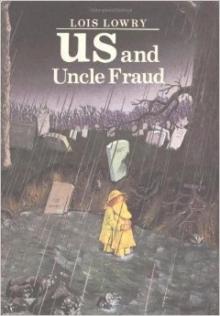 Us and Uncle Fraud
Us and Uncle Fraud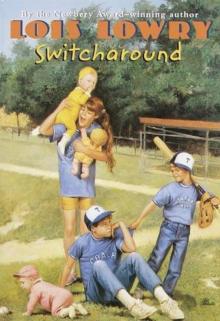 Switcharound
Switcharound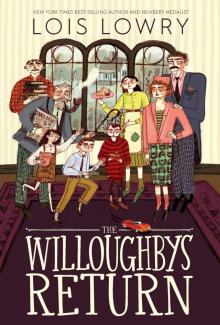 The Willoughbys Return
The Willoughbys Return Dear America: Like the Willow Tree
Dear America: Like the Willow Tree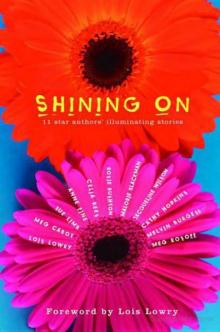 Shining On
Shining On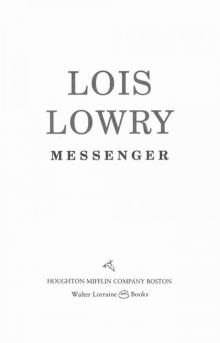 Messenger (The Giver Trilogy)
Messenger (The Giver Trilogy)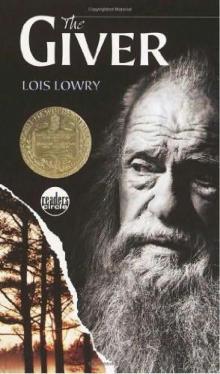 Giver Trilogy 01 - The Giver
Giver Trilogy 01 - The Giver